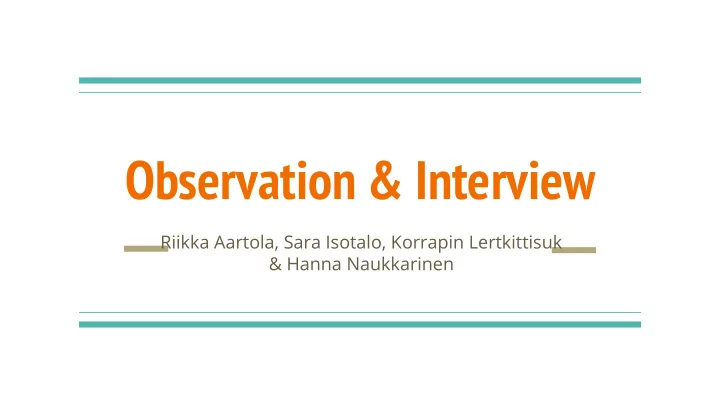

Observation & Interview Riikka Aartola, Sara Isotalo, Korrapin Lertkittisuk & Hanna Naukkarinen
Key Themes After discussing with the group we found these main themes throughout the observations and interviews: Participatory v. non-participatory observation ● Successful/unsuccessful interviewing techniques ●
Observation #1 Observation #2 Theme: Age and gender differences in Theme: Social interaction in ● ● communication multicultural event Situation: Local primary school, 2nd Situation: International Tea Party Event, ● ● grade, 8-9 year-old pupils, a Monday 2 - 3.30pm on 21/03/2016 at afternoon music class Multicultural Center Gloria The class teacher as an informant Informants are participants in the event ● ● Method: Participatory observation & Method: Participatory observation ● ● Non-participatory observation Different starting points; pre- ● assumptions
Participatory vs. Non-participatory observation Participatory ● The researcher is involved in the knowledge production, positionality ○ More sensible and thoughtful reactions and more holistic observations due to having ○ more knowledge of the context More in-depth understanding of the situation and the context, an insider’s eye, neutrality ○ Yet, knowledge might lead to expectations that might hinder the objectivity as a ○ researcher? Boundaries? Non-participatory ● No pre-assumptions or expectations? ○ More open to the situations that occur? ○ Yet, ‘an outsider’, superficiality, boundaries ○ Observations made by the researcher are hugely affected by their role in the ● specific context → Reflexivity!
Participatory observation Interaction with the people at the International Tea Party, while conducting the ● observation This participatory observation differed from the other because: ● This was the first time for both of us to visit Gloria, so we both had open ○ minds about what the situation would be like and were both able to observe rather objectively. In the other one there was background knowledge which supplied the ○ observer with assumptions The event had a theme (anti-racism) which may have lead us subconsciously ○ to try and break away from any prejudices we hold In this observation the lack of background knowledge was useful because we were ● able to observe objectively and in a relaxed way. We did not have an agenda to meet.
Interview #1 Interview #2 Theme: Immigrants & Finns (pre- and Theme: Finnish educational system as a ● ● post-assumptions) migrant Situation: Multicultural Center Gloria, a Situation: Interview with an international ● ● 30-something woman from Iran master’s student from the Phillipines for 15 mins in a private room ● A semi-structured interview An informal structured interview ●
Data collection gone wrong Not receiving data that you wanted or searched for ● Due to … ● the interview situation was poorly constructed? ‘atmosphere of sharing’ was not ○ established? the interviewee did not feel like sharing her thoughts as we are Finns asking about Finns? ○ she spoke the truth and really did not have any pre-assumptions? ○ problems with communication, researcher was not clear enough with her questions ○ the researcher’s poor preparation and ‘wrong’ questions? ○ the researcher’s lack of probing: sticking to the interview questions and missing many ○ good opportunities for follow up questions
How to do better next time? Need to pay more attention to: ● Rapport: eye-contact, sociality ○ Motivation: pitching, grooming, appeal ○ Security: neutrality, sensitivity, anonymity ○ Clarity: process, intent, theme ○ Important to ask the right questions and probe! ● Use open-ended questions that are still specific enough ○ Ask non-leading questions ○ The importance of probing! ○
Data collection went well We received a lot of information specifically about the topic we were interested in: ● migrants perception of the education system We were able to follow the preplanned questions and did not have to prompt the ● interviewee Interviewee was very interested in the topic: As a student he had a lot to say about the ○ education system Some of the questions were follow ups to things the interviewee had expressed, which ○ allowed for the interviewee to go even more in depth on the topics that were of interest to him The interviewee was quite dominant in terms of participation in the interview, he had a lot ○ to say and was not afraid to express his opinions in detail Interviewee was relaxed: the setting was quiet and private ○ The interview topic was universal and not too personal ○
Reasons for Success Use of open-ended and non-leading questions ● “What was your expectation of the education system?” ○ “Did it meet your expectations?” ○ “Would you mind talking about the learning culture between your home country and ○ Finland?” Use of restatement ● of what the interviewee said- to reassure the interviewer's interest in the interviewees ○ responses this also left room for the interviewee to guide the discussion towards the topics he found ○ most interesting Harnessing participation ● The interviewee was assertive and analytical- he was able to make connections and ○ comparisons of his native culture and the Finnish culture
References: ● Spradley, J. (1979) The ethnographic interview. New York: Holt, Rinehart and Winston. ● John Hopkins Bloomberg School of Public Health. Research publications, Center for Refugee and Disaster Response, Faculty Publications. Retrieved from: http://www.jhsph.edu/research/centers-and-institutes/center-for-refugee-and-disaster- response/publications_tools/publications/_pdf/pr_section_3.PDF ● Jeremy Gould’s lecture notes
Recommend
More recommend